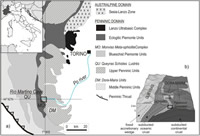A 10,000 yr record of high-resolution Paleosecular Variation from a flowstone of Rio Martino Cave, Northwestern Alps, Italy
Zanella E., E. Tema, L. Lanci, E. Regattieri, I. Isola, J.C. Hellstrom, E. Costa, G. Zanchetta, R.N. Drysdale, F. Magrì (2018).
Earth and Planetary Science Letters, 485, 32-42, doi: 10.1016/j.epsl.2017.12.047
Abstract
Speleothems are potentially excellent archives of the Earth’s magnetic field, capable of recording its past variations. Their characteristics, such as the continuity of the record, the possibility to be easily dated, the almost instantaneous remanence acquisition and the high time-resolution make them potentially unique high-quality Paleosecular Variation (PSV) recorders. Nevertheless, speleothems are commonly characterized by low magnetic intensities, which often limits their resolution. Here we present a paleomagnetic study performed on two cores from a flowstone from the Rio Martino Cave (Western Alps, Italy). U/Th dating indicates that the flowstone’s deposition covers almost the entire Holocene, spanning the period ca. 0.5–9.0 ka, while an estimation of its mean growth rate is around 1 mm per 15 years. The flowstone is composed of columnar calcite, characterized by a highly magnetic detrital content from meta-ophiolites in the cave’s catchment. This favorable geological context results in an intense magnetic signal that permits the preparation and measurement of thin (∼3 mm depth equivalent) samples, each representing around 45 yr. The Characteristic Remanent Magnetization (ChRM), isolated after systematic stepwise Alternating Field demagnetization, is well defined, with Maximum Angular Deviation (MAD) generally lower than 10°. Paleomagnetic directional data allow the reconstruction of the PSV path during the Holocene for the area. Comparison of the new data with archeomagnetic data from Italian archeological and volcanic records and using the predictions of the SHA.DIF.14k and pfm9k.1a global geomagnetic field models shows that the Rio Martino flowstone represents an excellent recorder of the Earth’s magnetic field during the last 9,000 years. Our high resolution paleomagnetic record, anchored by a high-quality chronology, provides promising data both for the detection of short term geomagnetic field variations and for complementing existing regional PSV curves for the prehistoric period, for which well-dated data are still scarce.
https://www.sciencedirect.com/science/article/pii/S0012821X18300037


